IBIS Hotel Marketing Plan: Strategies, Analysis, and Recommendations
VerifiedAdded on 2021/02/20
|13
|3118
|25
Report
AI Summary
This report offers a comprehensive analysis of the marketing strategies employed by the IBIS Hotel. It begins with an introduction to marketing concepts and then focuses on the IBIS Hotel, examining its marketing mix (product, price, place, promotion, process, people, and physical evidence) in comparison to competitors like Marriott. The report then delves into the development of a marketing plan for IBIS, outlining the company profile, vision, objectives, and marketing objectives. A SWOT analysis is conducted to assess the hotel's strengths, weaknesses, opportunities, and threats. Furthermore, the report explores the STP process (segmentation, targeting, and positioning) and marketing strategies, including financial information and implementation considerations. The assignment provides a detailed overview of the hotel's marketing efforts, strategies, and recommendations.
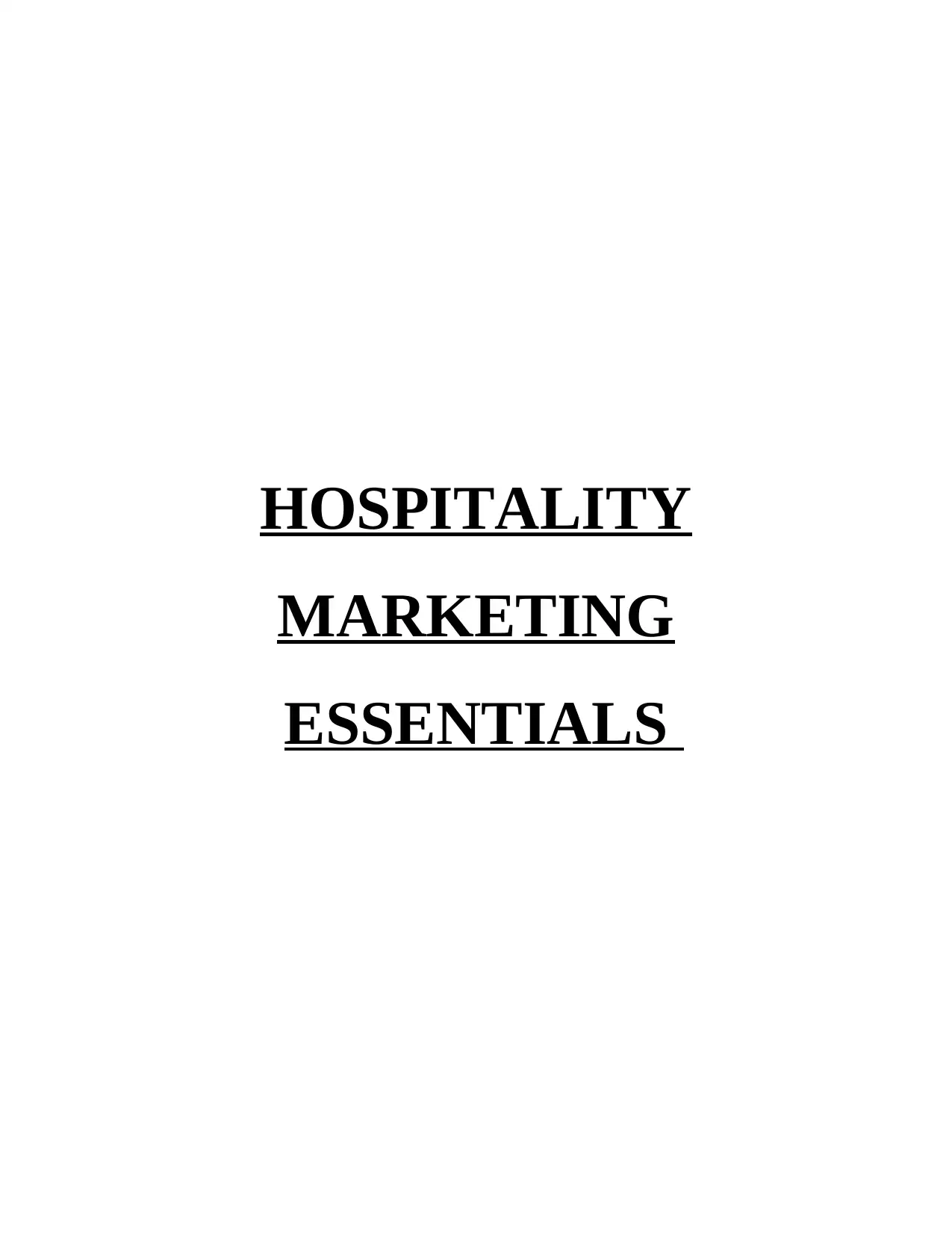
HOSPITALITY
MARKETING
ESSENTIALS
MARKETING
ESSENTIALS
Paraphrase This Document
Need a fresh take? Get an instant paraphrase of this document with our AI Paraphraser
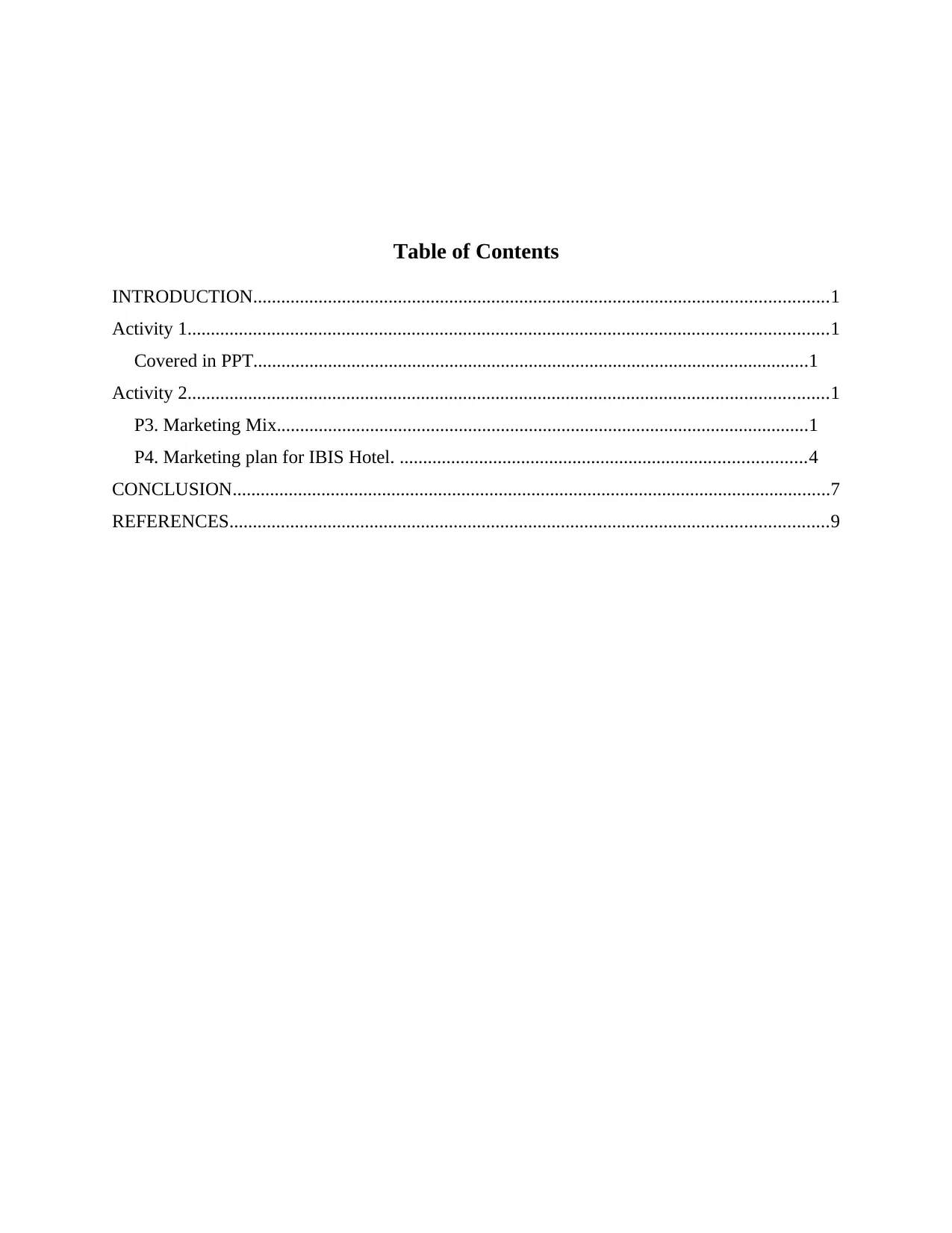
Table of Contents
INTRODUCTION...........................................................................................................................1
Activity 1.........................................................................................................................................1
Covered in PPT.......................................................................................................................1
Activity 2.........................................................................................................................................1
P3. Marketing Mix..................................................................................................................1
P4. Marketing plan for IBIS Hotel. .......................................................................................4
CONCLUSION................................................................................................................................7
REFERENCES................................................................................................................................9
INTRODUCTION...........................................................................................................................1
Activity 1.........................................................................................................................................1
Covered in PPT.......................................................................................................................1
Activity 2.........................................................................................................................................1
P3. Marketing Mix..................................................................................................................1
P4. Marketing plan for IBIS Hotel. .......................................................................................4
CONCLUSION................................................................................................................................7
REFERENCES................................................................................................................................9
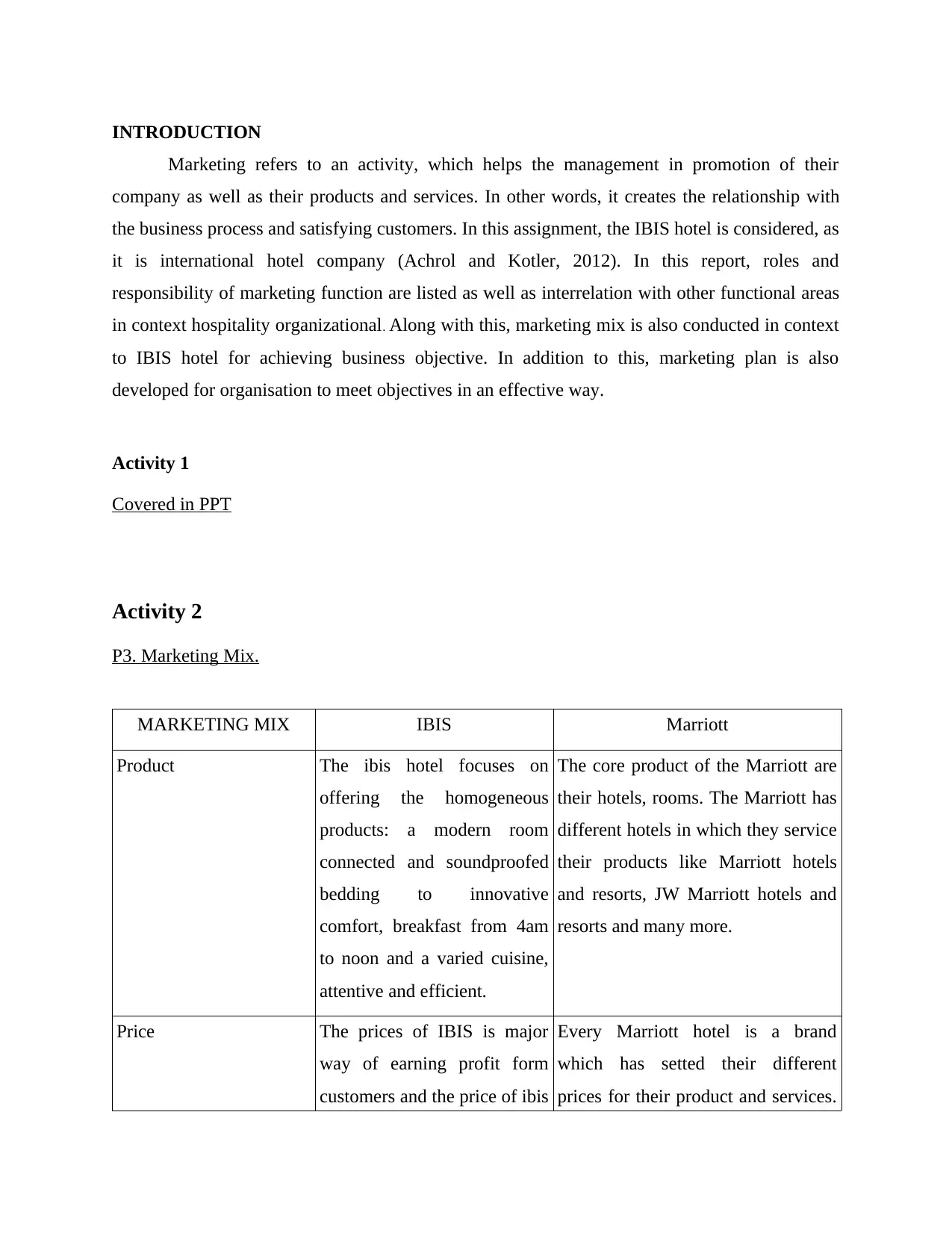
INTRODUCTION
Marketing refers to an activity, which helps the management in promotion of their
company as well as their products and services. In other words, it creates the relationship with
the business process and satisfying customers. In this assignment, the IBIS hotel is considered, as
it is international hotel company (Achrol and Kotler, 2012). In this report, roles and
responsibility of marketing function are listed as well as interrelation with other functional areas
in context hospitality organizational. Along with this, marketing mix is also conducted in context
to IBIS hotel for achieving business objective. In addition to this, marketing plan is also
developed for organisation to meet objectives in an effective way.
Activity 1
Covered in PPT
Activity 2
P3. Marketing Mix.
MARKETING MIX IBIS Marriott
Product The ibis hotel focuses on
offering the homogeneous
products: a modern room
connected and soundproofed
bedding to innovative
comfort, breakfast from 4am
to noon and a varied cuisine,
attentive and efficient.
The core product of the Marriott are
their hotels, rooms. The Marriott has
different hotels in which they service
their products like Marriott hotels
and resorts, JW Marriott hotels and
resorts and many more.
Price The prices of IBIS is major
way of earning profit form
customers and the price of ibis
Every Marriott hotel is a brand
which has setted their different
prices for their product and services.
Marketing refers to an activity, which helps the management in promotion of their
company as well as their products and services. In other words, it creates the relationship with
the business process and satisfying customers. In this assignment, the IBIS hotel is considered, as
it is international hotel company (Achrol and Kotler, 2012). In this report, roles and
responsibility of marketing function are listed as well as interrelation with other functional areas
in context hospitality organizational. Along with this, marketing mix is also conducted in context
to IBIS hotel for achieving business objective. In addition to this, marketing plan is also
developed for organisation to meet objectives in an effective way.
Activity 1
Covered in PPT
Activity 2
P3. Marketing Mix.
MARKETING MIX IBIS Marriott
Product The ibis hotel focuses on
offering the homogeneous
products: a modern room
connected and soundproofed
bedding to innovative
comfort, breakfast from 4am
to noon and a varied cuisine,
attentive and efficient.
The core product of the Marriott are
their hotels, rooms. The Marriott has
different hotels in which they service
their products like Marriott hotels
and resorts, JW Marriott hotels and
resorts and many more.
Price The prices of IBIS is major
way of earning profit form
customers and the price of ibis
Every Marriott hotel is a brand
which has setted their different
prices for their product and services.
⊘ This is a preview!⊘
Do you want full access?
Subscribe today to unlock all pages.

Trusted by 1+ million students worldwide
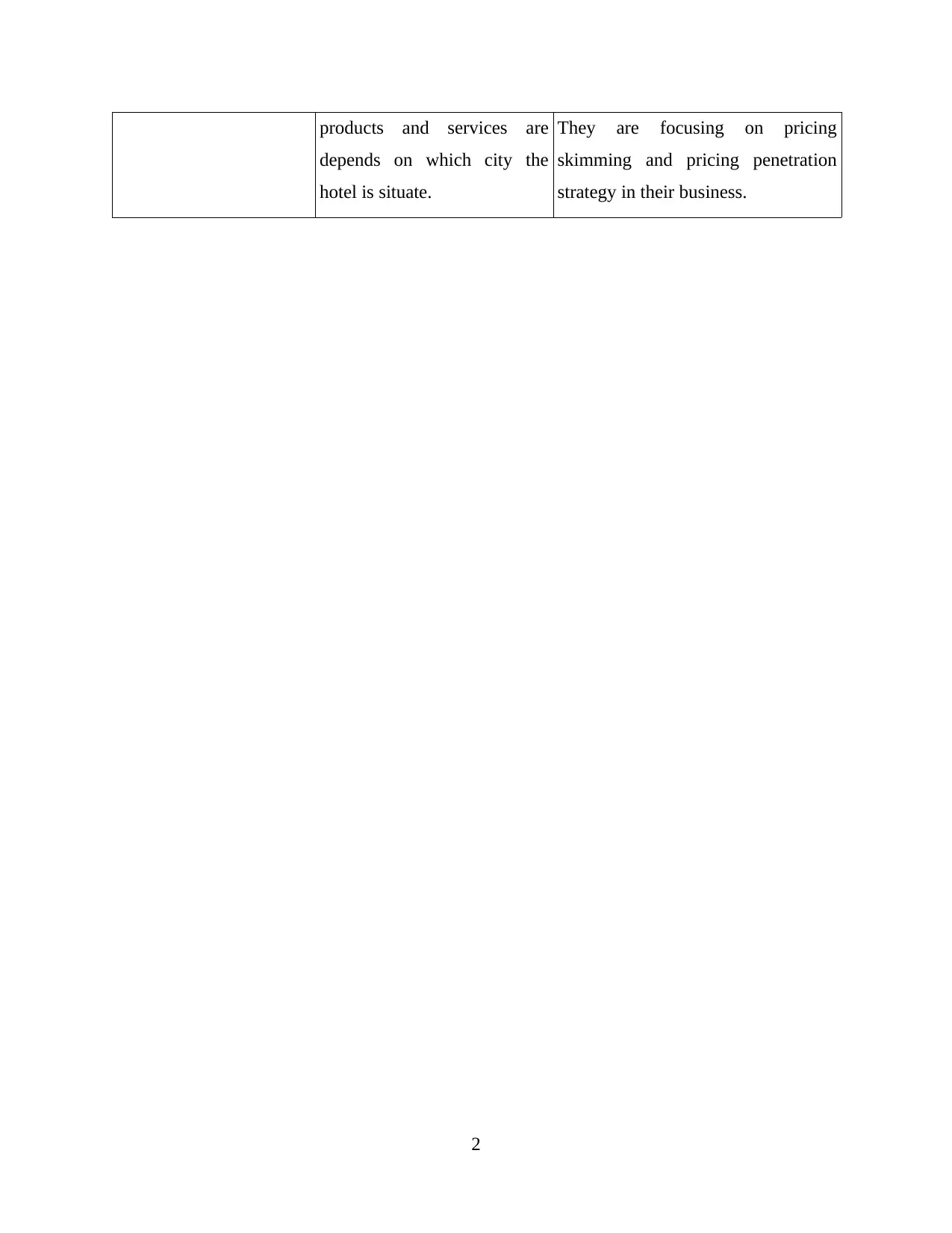
products and services are
depends on which city the
hotel is situate.
They are focusing on pricing
skimming and pricing penetration
strategy in their business.
2
depends on which city the
hotel is situate.
They are focusing on pricing
skimming and pricing penetration
strategy in their business.
2
Paraphrase This Document
Need a fresh take? Get an instant paraphrase of this document with our AI Paraphraser
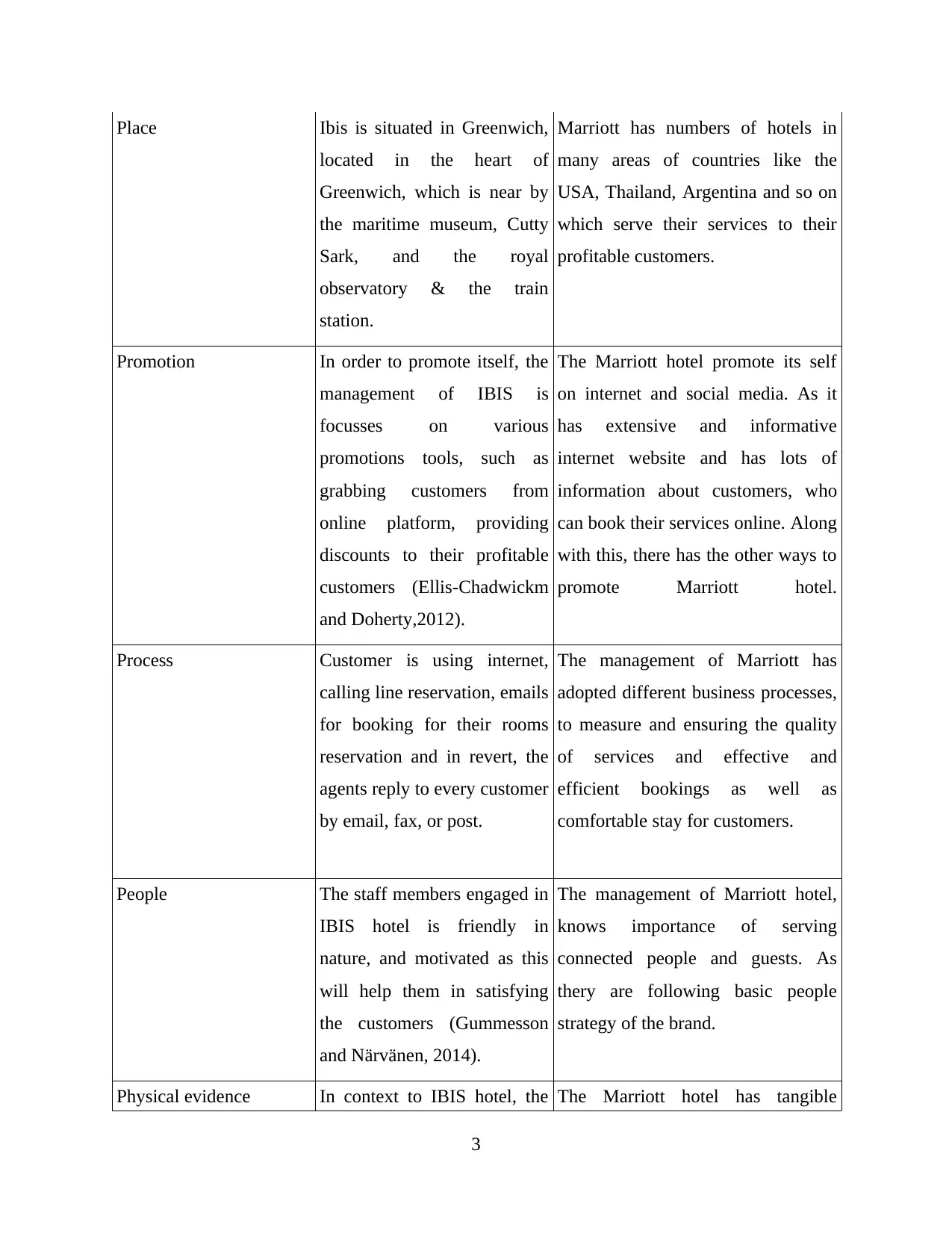
Place Ibis is situated in Greenwich,
located in the heart of
Greenwich, which is near by
the maritime museum, Cutty
Sark, and the royal
observatory & the train
station.
Marriott has numbers of hotels in
many areas of countries like the
USA, Thailand, Argentina and so on
which serve their services to their
profitable customers.
Promotion In order to promote itself, the
management of IBIS is
focusses on various
promotions tools, such as
grabbing customers from
online platform, providing
discounts to their profitable
customers (Ellis-Chadwickm
and Doherty,2012).
The Marriott hotel promote its self
on internet and social media. As it
has extensive and informative
internet website and has lots of
information about customers, who
can book their services online. Along
with this, there has the other ways to
promote Marriott hotel.
Process Customer is using internet,
calling line reservation, emails
for booking for their rooms
reservation and in revert, the
agents reply to every customer
by email, fax, or post.
The management of Marriott has
adopted different business processes,
to measure and ensuring the quality
of services and effective and
efficient bookings as well as
comfortable stay for customers.
People The staff members engaged in
IBIS hotel is friendly in
nature, and motivated as this
will help them in satisfying
the customers (Gummesson
and Närvänen, 2014).
The management of Marriott hotel,
knows importance of serving
connected people and guests. As
thery are following basic people
strategy of the brand.
Physical evidence In context to IBIS hotel, the The Marriott hotel has tangible
3
located in the heart of
Greenwich, which is near by
the maritime museum, Cutty
Sark, and the royal
observatory & the train
station.
Marriott has numbers of hotels in
many areas of countries like the
USA, Thailand, Argentina and so on
which serve their services to their
profitable customers.
Promotion In order to promote itself, the
management of IBIS is
focusses on various
promotions tools, such as
grabbing customers from
online platform, providing
discounts to their profitable
customers (Ellis-Chadwickm
and Doherty,2012).
The Marriott hotel promote its self
on internet and social media. As it
has extensive and informative
internet website and has lots of
information about customers, who
can book their services online. Along
with this, there has the other ways to
promote Marriott hotel.
Process Customer is using internet,
calling line reservation, emails
for booking for their rooms
reservation and in revert, the
agents reply to every customer
by email, fax, or post.
The management of Marriott has
adopted different business processes,
to measure and ensuring the quality
of services and effective and
efficient bookings as well as
comfortable stay for customers.
People The staff members engaged in
IBIS hotel is friendly in
nature, and motivated as this
will help them in satisfying
the customers (Gummesson
and Närvänen, 2014).
The management of Marriott hotel,
knows importance of serving
connected people and guests. As
thery are following basic people
strategy of the brand.
Physical evidence In context to IBIS hotel, the The Marriott hotel has tangible
3
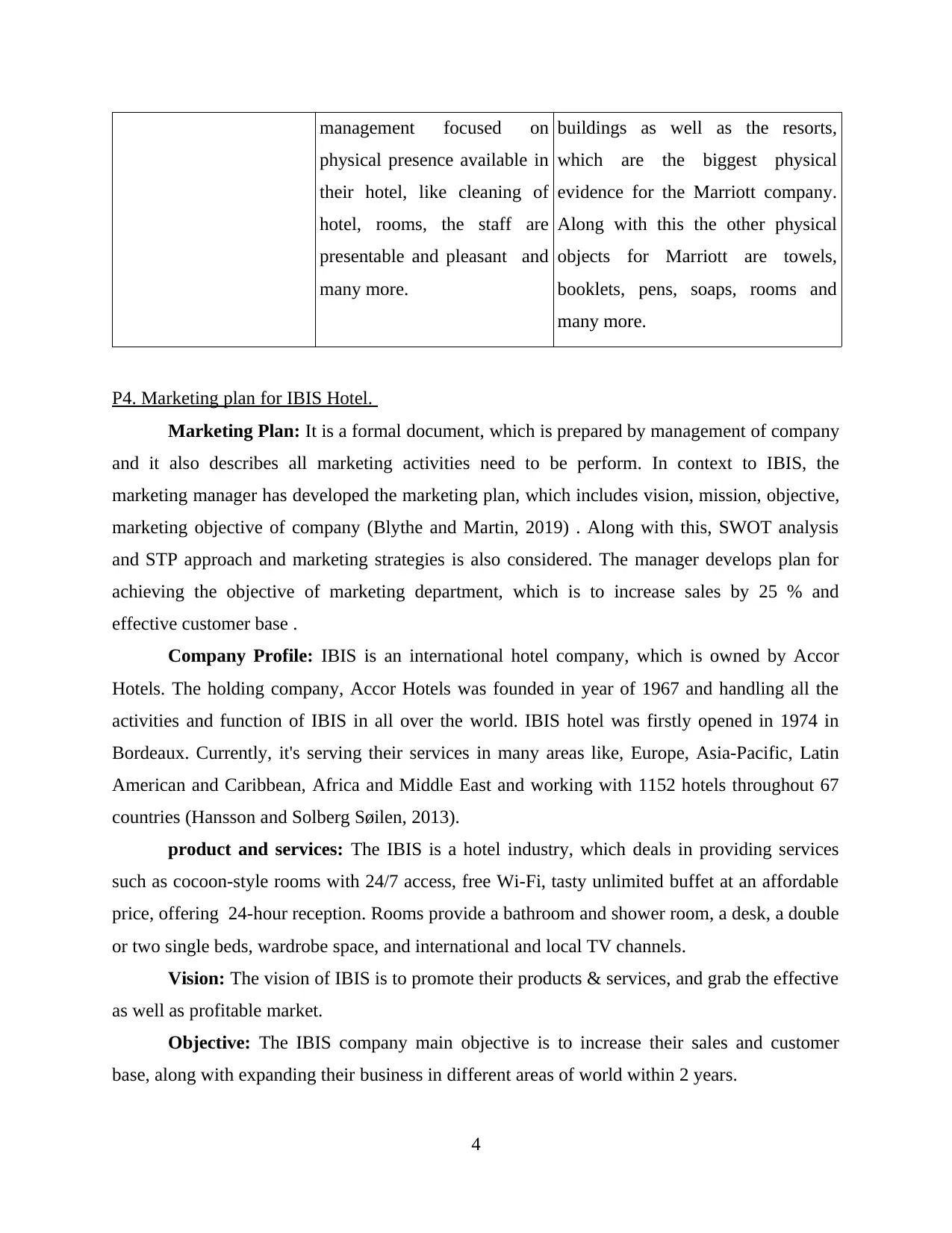
management focused on
physical presence available in
their hotel, like cleaning of
hotel, rooms, the staff are
presentable and pleasant and
many more.
buildings as well as the resorts,
which are the biggest physical
evidence for the Marriott company.
Along with this the other physical
objects for Marriott are towels,
booklets, pens, soaps, rooms and
many more.
P4. Marketing plan for IBIS Hotel.
Marketing Plan: It is a formal document, which is prepared by management of company
and it also describes all marketing activities need to be perform. In context to IBIS, the
marketing manager has developed the marketing plan, which includes vision, mission, objective,
marketing objective of company (Blythe and Martin, 2019) . Along with this, SWOT analysis
and STP approach and marketing strategies is also considered. The manager develops plan for
achieving the objective of marketing department, which is to increase sales by 25 % and
effective customer base .
Company Profile: IBIS is an international hotel company, which is owned by Accor
Hotels. The holding company, Accor Hotels was founded in year of 1967 and handling all the
activities and function of IBIS in all over the world. IBIS hotel was firstly opened in 1974 in
Bordeaux. Currently, it's serving their services in many areas like, Europe, Asia-Pacific, Latin
American and Caribbean, Africa and Middle East and working with 1152 hotels throughout 67
countries (Hansson and Solberg Søilen, 2013).
product and services: The IBIS is a hotel industry, which deals in providing services
such as cocoon-style rooms with 24/7 access, free Wi-Fi, tasty unlimited buffet at an affordable
price, offering 24-hour reception. Rooms provide a bathroom and shower room, a desk, a double
or two single beds, wardrobe space, and international and local TV channels.
Vision: The vision of IBIS is to promote their products & services, and grab the effective
as well as profitable market.
Objective: The IBIS company main objective is to increase their sales and customer
base, along with expanding their business in different areas of world within 2 years.
4
physical presence available in
their hotel, like cleaning of
hotel, rooms, the staff are
presentable and pleasant and
many more.
buildings as well as the resorts,
which are the biggest physical
evidence for the Marriott company.
Along with this the other physical
objects for Marriott are towels,
booklets, pens, soaps, rooms and
many more.
P4. Marketing plan for IBIS Hotel.
Marketing Plan: It is a formal document, which is prepared by management of company
and it also describes all marketing activities need to be perform. In context to IBIS, the
marketing manager has developed the marketing plan, which includes vision, mission, objective,
marketing objective of company (Blythe and Martin, 2019) . Along with this, SWOT analysis
and STP approach and marketing strategies is also considered. The manager develops plan for
achieving the objective of marketing department, which is to increase sales by 25 % and
effective customer base .
Company Profile: IBIS is an international hotel company, which is owned by Accor
Hotels. The holding company, Accor Hotels was founded in year of 1967 and handling all the
activities and function of IBIS in all over the world. IBIS hotel was firstly opened in 1974 in
Bordeaux. Currently, it's serving their services in many areas like, Europe, Asia-Pacific, Latin
American and Caribbean, Africa and Middle East and working with 1152 hotels throughout 67
countries (Hansson and Solberg Søilen, 2013).
product and services: The IBIS is a hotel industry, which deals in providing services
such as cocoon-style rooms with 24/7 access, free Wi-Fi, tasty unlimited buffet at an affordable
price, offering 24-hour reception. Rooms provide a bathroom and shower room, a desk, a double
or two single beds, wardrobe space, and international and local TV channels.
Vision: The vision of IBIS is to promote their products & services, and grab the effective
as well as profitable market.
Objective: The IBIS company main objective is to increase their sales and customer
base, along with expanding their business in different areas of world within 2 years.
4
⊘ This is a preview!⊘
Do you want full access?
Subscribe today to unlock all pages.

Trusted by 1+ million students worldwide
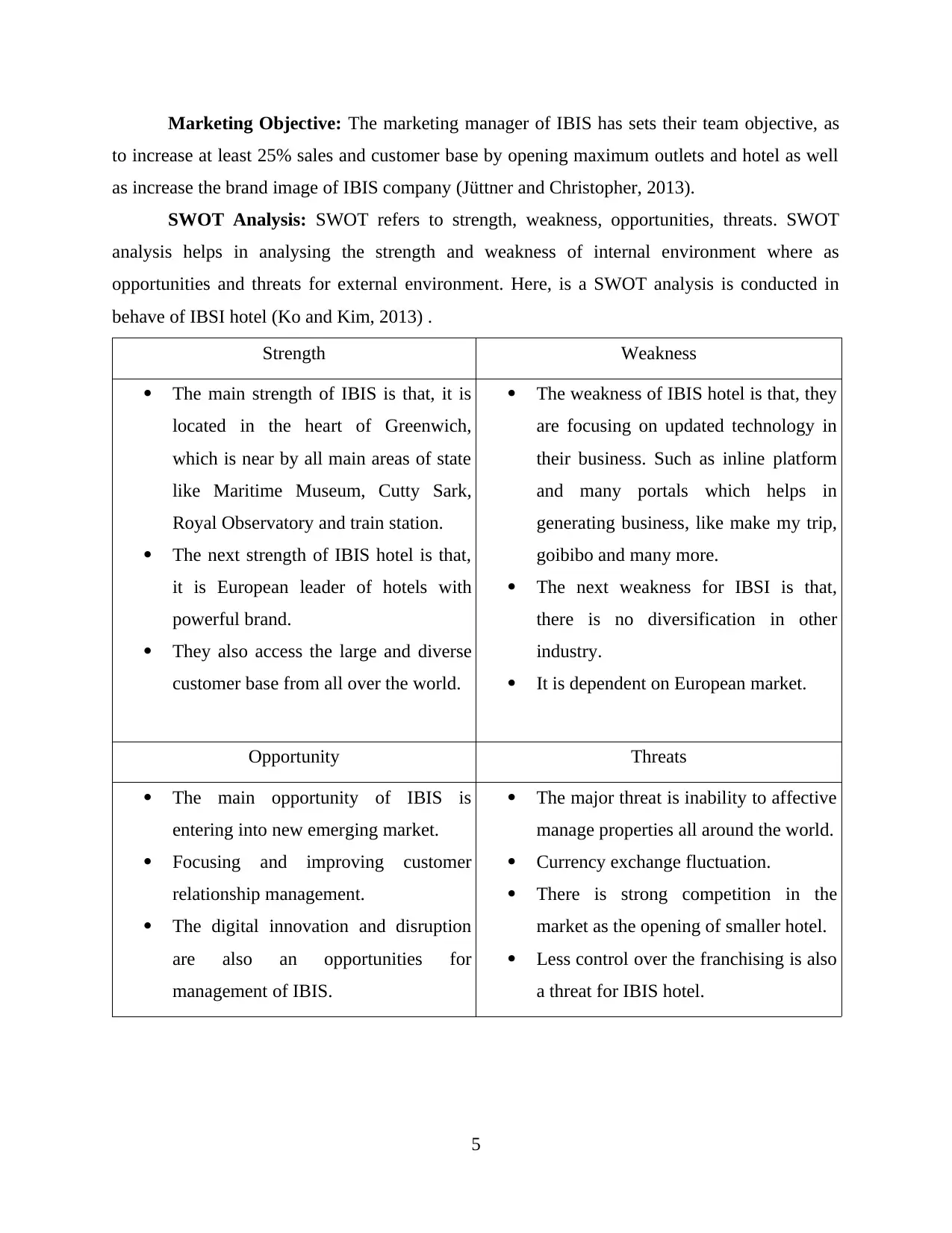
Marketing Objective: The marketing manager of IBIS has sets their team objective, as
to increase at least 25% sales and customer base by opening maximum outlets and hotel as well
as increase the brand image of IBIS company (Jüttner and Christopher, 2013).
SWOT Analysis: SWOT refers to strength, weakness, opportunities, threats. SWOT
analysis helps in analysing the strength and weakness of internal environment where as
opportunities and threats for external environment. Here, is a SWOT analysis is conducted in
behave of IBSI hotel (Ko and Kim, 2013) .
Strength Weakness
The main strength of IBIS is that, it is
located in the heart of Greenwich,
which is near by all main areas of state
like Maritime Museum, Cutty Sark,
Royal Observatory and train station.
The next strength of IBIS hotel is that,
it is European leader of hotels with
powerful brand.
They also access the large and diverse
customer base from all over the world.
The weakness of IBIS hotel is that, they
are focusing on updated technology in
their business. Such as inline platform
and many portals which helps in
generating business, like make my trip,
goibibo and many more.
The next weakness for IBSI is that,
there is no diversification in other
industry.
It is dependent on European market.
Opportunity Threats
The main opportunity of IBIS is
entering into new emerging market.
Focusing and improving customer
relationship management.
The digital innovation and disruption
are also an opportunities for
management of IBIS.
The major threat is inability to affective
manage properties all around the world.
Currency exchange fluctuation.
There is strong competition in the
market as the opening of smaller hotel.
Less control over the franchising is also
a threat for IBIS hotel.
5
to increase at least 25% sales and customer base by opening maximum outlets and hotel as well
as increase the brand image of IBIS company (Jüttner and Christopher, 2013).
SWOT Analysis: SWOT refers to strength, weakness, opportunities, threats. SWOT
analysis helps in analysing the strength and weakness of internal environment where as
opportunities and threats for external environment. Here, is a SWOT analysis is conducted in
behave of IBSI hotel (Ko and Kim, 2013) .
Strength Weakness
The main strength of IBIS is that, it is
located in the heart of Greenwich,
which is near by all main areas of state
like Maritime Museum, Cutty Sark,
Royal Observatory and train station.
The next strength of IBIS hotel is that,
it is European leader of hotels with
powerful brand.
They also access the large and diverse
customer base from all over the world.
The weakness of IBIS hotel is that, they
are focusing on updated technology in
their business. Such as inline platform
and many portals which helps in
generating business, like make my trip,
goibibo and many more.
The next weakness for IBSI is that,
there is no diversification in other
industry.
It is dependent on European market.
Opportunity Threats
The main opportunity of IBIS is
entering into new emerging market.
Focusing and improving customer
relationship management.
The digital innovation and disruption
are also an opportunities for
management of IBIS.
The major threat is inability to affective
manage properties all around the world.
Currency exchange fluctuation.
There is strong competition in the
market as the opening of smaller hotel.
Less control over the franchising is also
a threat for IBIS hotel.
5
Paraphrase This Document
Need a fresh take? Get an instant paraphrase of this document with our AI Paraphraser
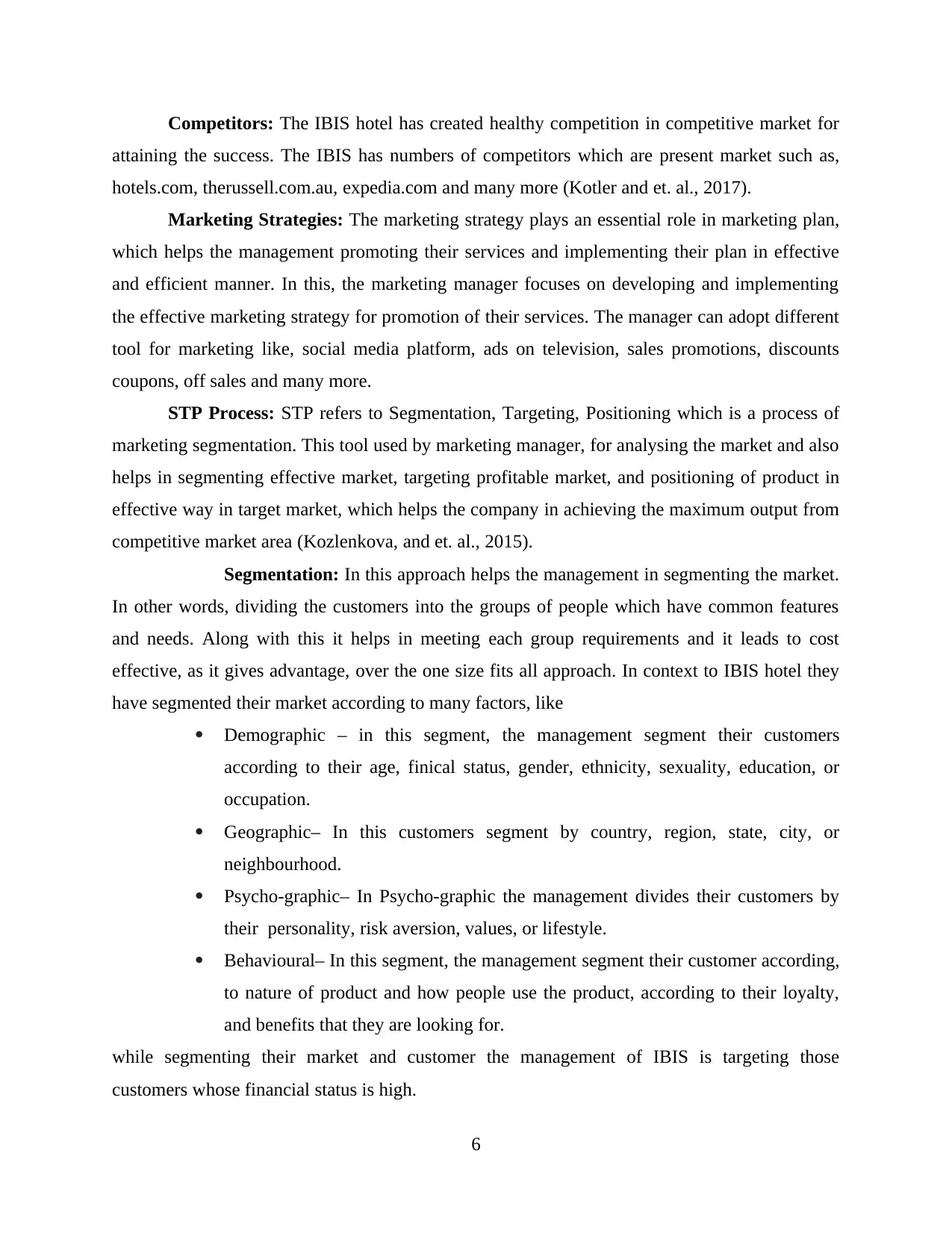
Competitors: The IBIS hotel has created healthy competition in competitive market for
attaining the success. The IBIS has numbers of competitors which are present market such as,
hotels.com, therussell.com.au, expedia.com and many more (Kotler and et. al., 2017).
Marketing Strategies: The marketing strategy plays an essential role in marketing plan,
which helps the management promoting their services and implementing their plan in effective
and efficient manner. In this, the marketing manager focuses on developing and implementing
the effective marketing strategy for promotion of their services. The manager can adopt different
tool for marketing like, social media platform, ads on television, sales promotions, discounts
coupons, off sales and many more.
STP Process: STP refers to Segmentation, Targeting, Positioning which is a process of
marketing segmentation. This tool used by marketing manager, for analysing the market and also
helps in segmenting effective market, targeting profitable market, and positioning of product in
effective way in target market, which helps the company in achieving the maximum output from
competitive market area (Kozlenkova, and et. al., 2015).
Segmentation: In this approach helps the management in segmenting the market.
In other words, dividing the customers into the groups of people which have common features
and needs. Along with this it helps in meeting each group requirements and it leads to cost
effective, as it gives advantage, over the one size fits all approach. In context to IBIS hotel they
have segmented their market according to many factors, like
Demographic – in this segment, the management segment their customers
according to their age, finical status, gender, ethnicity, sexuality, education, or
occupation.
Geographic– In this customers segment by country, region, state, city, or
neighbourhood.
Psycho-graphic– In Psycho-graphic the management divides their customers by
their personality, risk aversion, values, or lifestyle.
Behavioural– In this segment, the management segment their customer according,
to nature of product and how people use the product, according to their loyalty,
and benefits that they are looking for.
while segmenting their market and customer the management of IBIS is targeting those
customers whose financial status is high.
6
attaining the success. The IBIS has numbers of competitors which are present market such as,
hotels.com, therussell.com.au, expedia.com and many more (Kotler and et. al., 2017).
Marketing Strategies: The marketing strategy plays an essential role in marketing plan,
which helps the management promoting their services and implementing their plan in effective
and efficient manner. In this, the marketing manager focuses on developing and implementing
the effective marketing strategy for promotion of their services. The manager can adopt different
tool for marketing like, social media platform, ads on television, sales promotions, discounts
coupons, off sales and many more.
STP Process: STP refers to Segmentation, Targeting, Positioning which is a process of
marketing segmentation. This tool used by marketing manager, for analysing the market and also
helps in segmenting effective market, targeting profitable market, and positioning of product in
effective way in target market, which helps the company in achieving the maximum output from
competitive market area (Kozlenkova, and et. al., 2015).
Segmentation: In this approach helps the management in segmenting the market.
In other words, dividing the customers into the groups of people which have common features
and needs. Along with this it helps in meeting each group requirements and it leads to cost
effective, as it gives advantage, over the one size fits all approach. In context to IBIS hotel they
have segmented their market according to many factors, like
Demographic – in this segment, the management segment their customers
according to their age, finical status, gender, ethnicity, sexuality, education, or
occupation.
Geographic– In this customers segment by country, region, state, city, or
neighbourhood.
Psycho-graphic– In Psycho-graphic the management divides their customers by
their personality, risk aversion, values, or lifestyle.
Behavioural– In this segment, the management segment their customer according,
to nature of product and how people use the product, according to their loyalty,
and benefits that they are looking for.
while segmenting their market and customer the management of IBIS is targeting those
customers whose financial status is high.
6
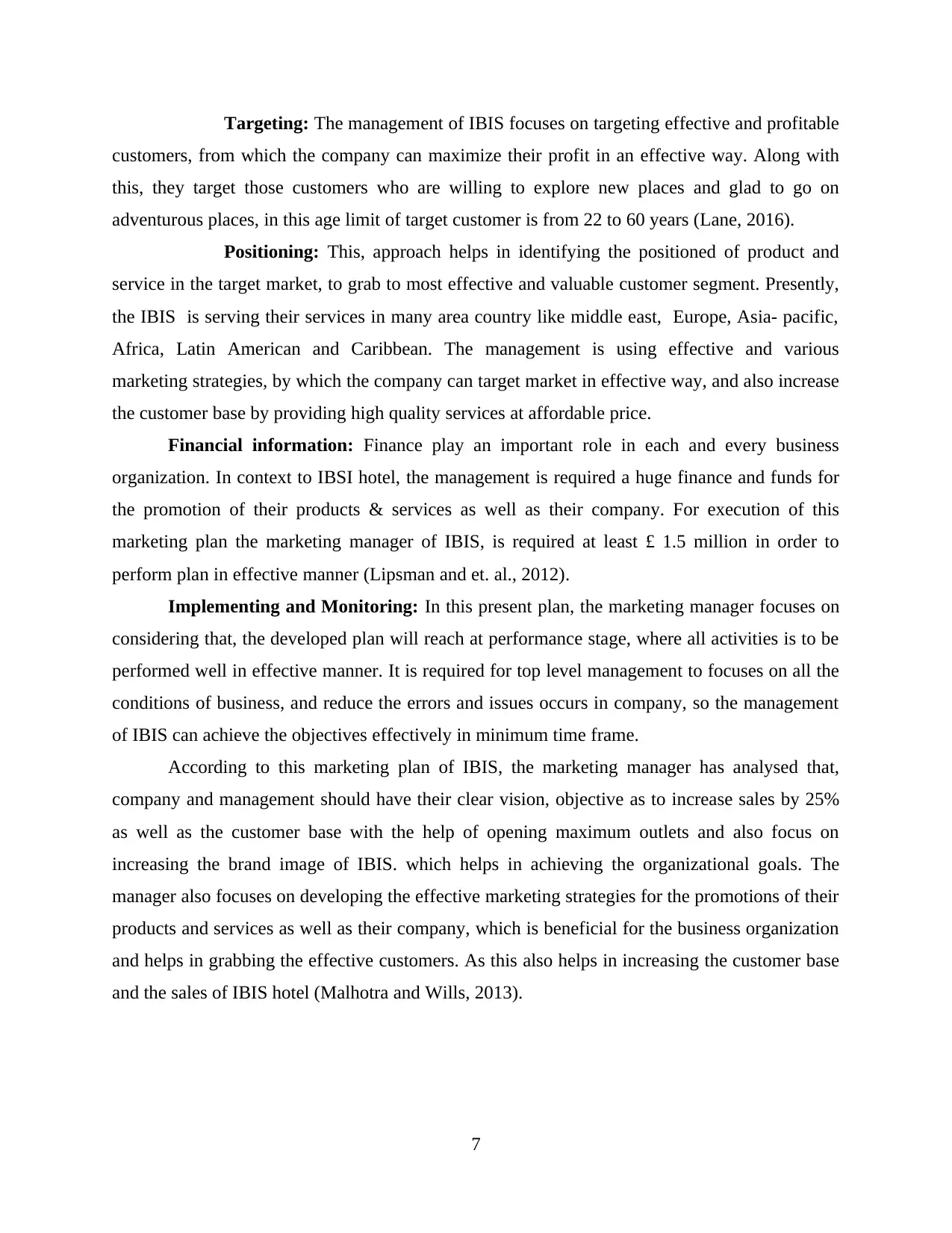
Targeting: The management of IBIS focuses on targeting effective and profitable
customers, from which the company can maximize their profit in an effective way. Along with
this, they target those customers who are willing to explore new places and glad to go on
adventurous places, in this age limit of target customer is from 22 to 60 years (Lane, 2016).
Positioning: This, approach helps in identifying the positioned of product and
service in the target market, to grab to most effective and valuable customer segment. Presently,
the IBIS is serving their services in many area country like middle east, Europe, Asia- pacific,
Africa, Latin American and Caribbean. The management is using effective and various
marketing strategies, by which the company can target market in effective way, and also increase
the customer base by providing high quality services at affordable price.
Financial information: Finance play an important role in each and every business
organization. In context to IBSI hotel, the management is required a huge finance and funds for
the promotion of their products & services as well as their company. For execution of this
marketing plan the marketing manager of IBIS, is required at least £ 1.5 million in order to
perform plan in effective manner (Lipsman and et. al., 2012).
Implementing and Monitoring: In this present plan, the marketing manager focuses on
considering that, the developed plan will reach at performance stage, where all activities is to be
performed well in effective manner. It is required for top level management to focuses on all the
conditions of business, and reduce the errors and issues occurs in company, so the management
of IBIS can achieve the objectives effectively in minimum time frame.
According to this marketing plan of IBIS, the marketing manager has analysed that,
company and management should have their clear vision, objective as to increase sales by 25%
as well as the customer base with the help of opening maximum outlets and also focus on
increasing the brand image of IBIS. which helps in achieving the organizational goals. The
manager also focuses on developing the effective marketing strategies for the promotions of their
products and services as well as their company, which is beneficial for the business organization
and helps in grabbing the effective customers. As this also helps in increasing the customer base
and the sales of IBIS hotel (Malhotra and Wills, 2013).
7
customers, from which the company can maximize their profit in an effective way. Along with
this, they target those customers who are willing to explore new places and glad to go on
adventurous places, in this age limit of target customer is from 22 to 60 years (Lane, 2016).
Positioning: This, approach helps in identifying the positioned of product and
service in the target market, to grab to most effective and valuable customer segment. Presently,
the IBIS is serving their services in many area country like middle east, Europe, Asia- pacific,
Africa, Latin American and Caribbean. The management is using effective and various
marketing strategies, by which the company can target market in effective way, and also increase
the customer base by providing high quality services at affordable price.
Financial information: Finance play an important role in each and every business
organization. In context to IBSI hotel, the management is required a huge finance and funds for
the promotion of their products & services as well as their company. For execution of this
marketing plan the marketing manager of IBIS, is required at least £ 1.5 million in order to
perform plan in effective manner (Lipsman and et. al., 2012).
Implementing and Monitoring: In this present plan, the marketing manager focuses on
considering that, the developed plan will reach at performance stage, where all activities is to be
performed well in effective manner. It is required for top level management to focuses on all the
conditions of business, and reduce the errors and issues occurs in company, so the management
of IBIS can achieve the objectives effectively in minimum time frame.
According to this marketing plan of IBIS, the marketing manager has analysed that,
company and management should have their clear vision, objective as to increase sales by 25%
as well as the customer base with the help of opening maximum outlets and also focus on
increasing the brand image of IBIS. which helps in achieving the organizational goals. The
manager also focuses on developing the effective marketing strategies for the promotions of their
products and services as well as their company, which is beneficial for the business organization
and helps in grabbing the effective customers. As this also helps in increasing the customer base
and the sales of IBIS hotel (Malhotra and Wills, 2013).
7
⊘ This is a preview!⊘
Do you want full access?
Subscribe today to unlock all pages.

Trusted by 1+ million students worldwide
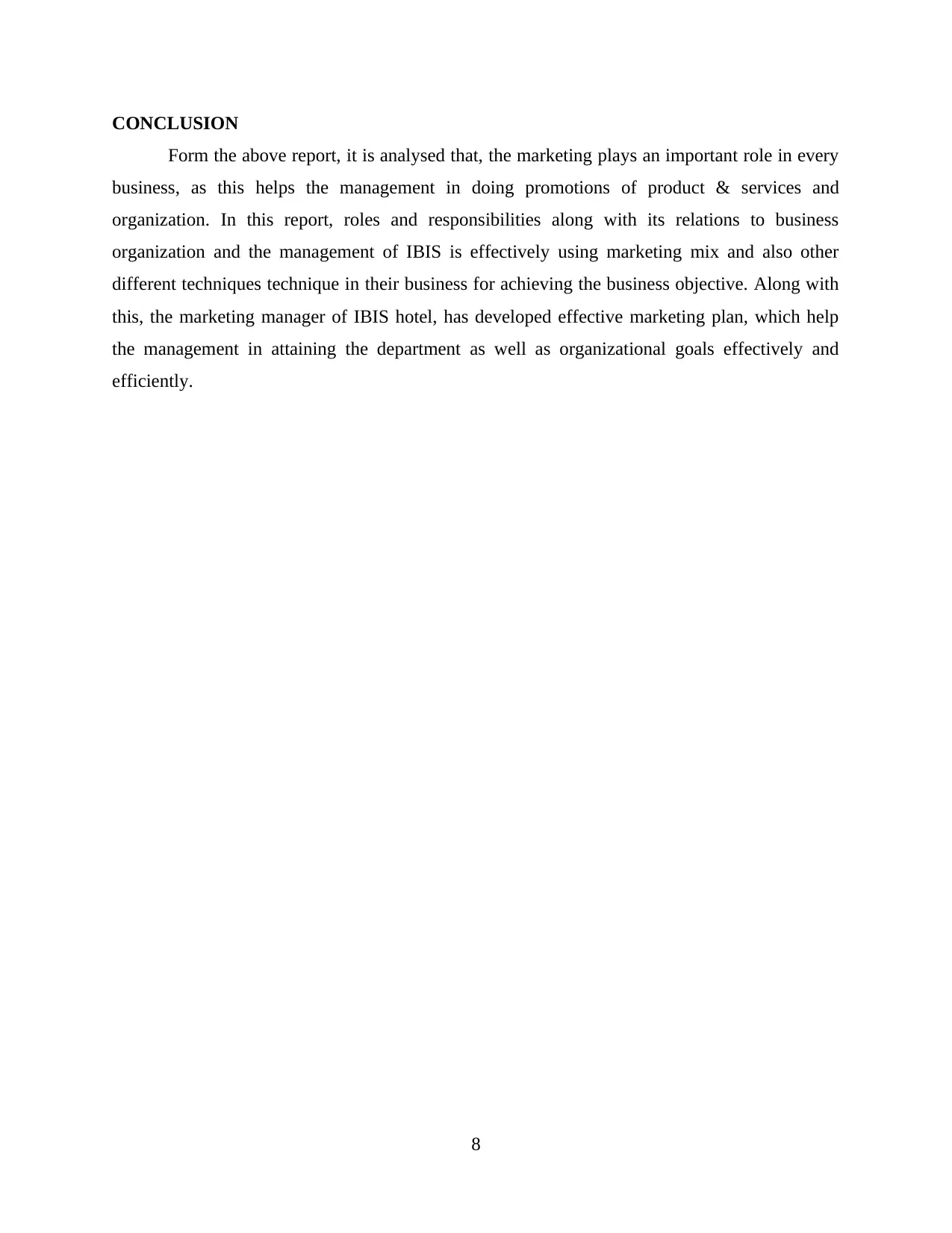
CONCLUSION
Form the above report, it is analysed that, the marketing plays an important role in every
business, as this helps the management in doing promotions of product & services and
organization. In this report, roles and responsibilities along with its relations to business
organization and the management of IBIS is effectively using marketing mix and also other
different techniques technique in their business for achieving the business objective. Along with
this, the marketing manager of IBIS hotel, has developed effective marketing plan, which help
the management in attaining the department as well as organizational goals effectively and
efficiently.
8
Form the above report, it is analysed that, the marketing plays an important role in every
business, as this helps the management in doing promotions of product & services and
organization. In this report, roles and responsibilities along with its relations to business
organization and the management of IBIS is effectively using marketing mix and also other
different techniques technique in their business for achieving the business objective. Along with
this, the marketing manager of IBIS hotel, has developed effective marketing plan, which help
the management in attaining the department as well as organizational goals effectively and
efficiently.
8
Paraphrase This Document
Need a fresh take? Get an instant paraphrase of this document with our AI Paraphraser
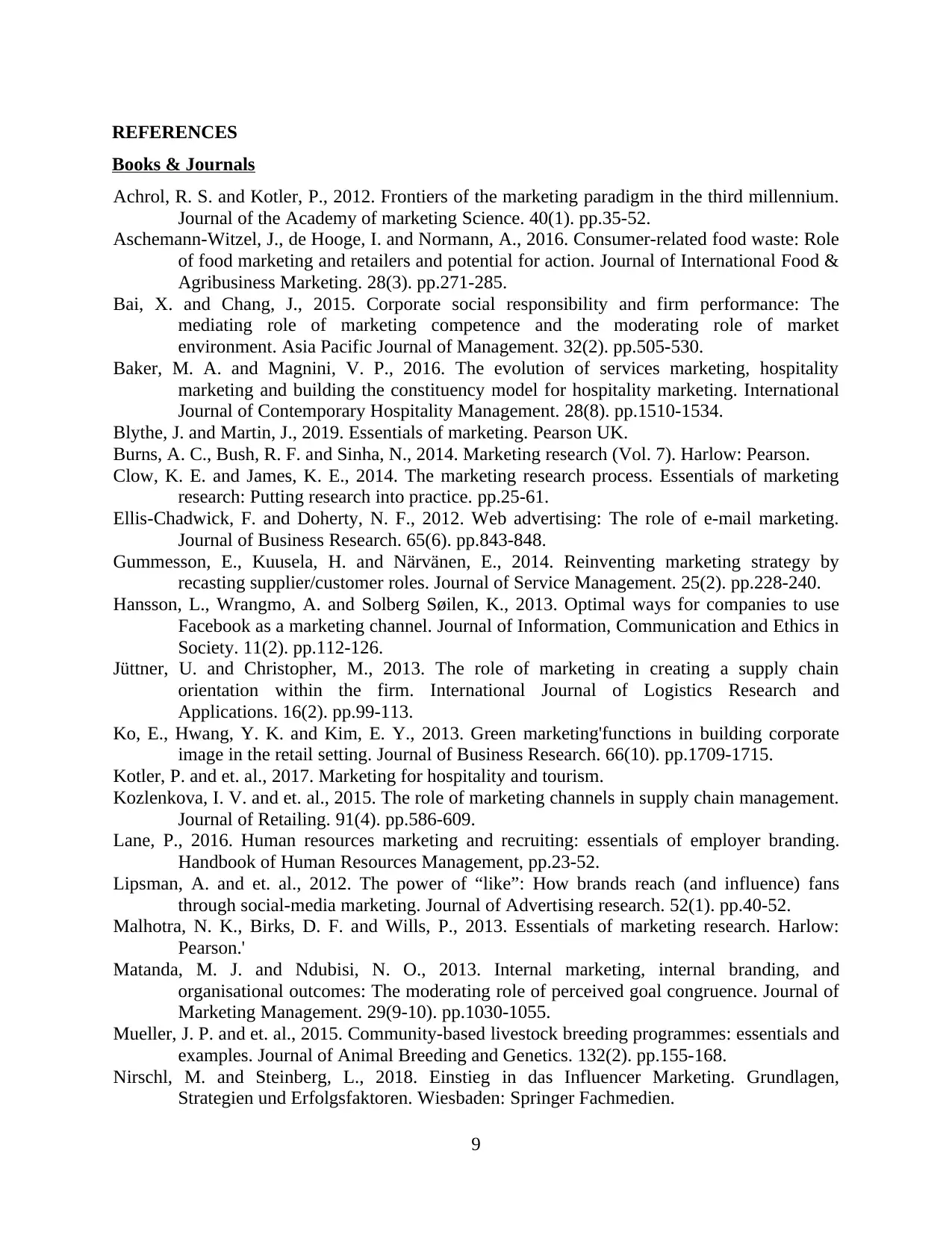
REFERENCES
Books & Journals
Achrol, R. S. and Kotler, P., 2012. Frontiers of the marketing paradigm in the third millennium.
Journal of the Academy of marketing Science. 40(1). pp.35-52.
Aschemann-Witzel, J., de Hooge, I. and Normann, A., 2016. Consumer-related food waste: Role
of food marketing and retailers and potential for action. Journal of International Food &
Agribusiness Marketing. 28(3). pp.271-285.
Bai, X. and Chang, J., 2015. Corporate social responsibility and firm performance: The
mediating role of marketing competence and the moderating role of market
environment. Asia Pacific Journal of Management. 32(2). pp.505-530.
Baker, M. A. and Magnini, V. P., 2016. The evolution of services marketing, hospitality
marketing and building the constituency model for hospitality marketing. International
Journal of Contemporary Hospitality Management. 28(8). pp.1510-1534.
Blythe, J. and Martin, J., 2019. Essentials of marketing. Pearson UK.
Burns, A. C., Bush, R. F. and Sinha, N., 2014. Marketing research (Vol. 7). Harlow: Pearson.
Clow, K. E. and James, K. E., 2014. The marketing research process. Essentials of marketing
research: Putting research into practice. pp.25-61.
Ellis-Chadwick, F. and Doherty, N. F., 2012. Web advertising: The role of e-mail marketing.
Journal of Business Research. 65(6). pp.843-848.
Gummesson, E., Kuusela, H. and Närvänen, E., 2014. Reinventing marketing strategy by
recasting supplier/customer roles. Journal of Service Management. 25(2). pp.228-240.
Hansson, L., Wrangmo, A. and Solberg Søilen, K., 2013. Optimal ways for companies to use
Facebook as a marketing channel. Journal of Information, Communication and Ethics in
Society. 11(2). pp.112-126.
Jüttner, U. and Christopher, M., 2013. The role of marketing in creating a supply chain
orientation within the firm. International Journal of Logistics Research and
Applications. 16(2). pp.99-113.
Ko, E., Hwang, Y. K. and Kim, E. Y., 2013. Green marketing'functions in building corporate
image in the retail setting. Journal of Business Research. 66(10). pp.1709-1715.
Kotler, P. and et. al., 2017. Marketing for hospitality and tourism.
Kozlenkova, I. V. and et. al., 2015. The role of marketing channels in supply chain management.
Journal of Retailing. 91(4). pp.586-609.
Lane, P., 2016. Human resources marketing and recruiting: essentials of employer branding.
Handbook of Human Resources Management, pp.23-52.
Lipsman, A. and et. al., 2012. The power of “like”: How brands reach (and influence) fans
through social-media marketing. Journal of Advertising research. 52(1). pp.40-52.
Malhotra, N. K., Birks, D. F. and Wills, P., 2013. Essentials of marketing research. Harlow:
Pearson.'
Matanda, M. J. and Ndubisi, N. O., 2013. Internal marketing, internal branding, and
organisational outcomes: The moderating role of perceived goal congruence. Journal of
Marketing Management. 29(9-10). pp.1030-1055.
Mueller, J. P. and et. al., 2015. Community‐based livestock breeding programmes: essentials and
examples. Journal of Animal Breeding and Genetics. 132(2). pp.155-168.
Nirschl, M. and Steinberg, L., 2018. Einstieg in das Influencer Marketing. Grundlagen,
Strategien und Erfolgsfaktoren. Wiesbaden: Springer Fachmedien.
9
Books & Journals
Achrol, R. S. and Kotler, P., 2012. Frontiers of the marketing paradigm in the third millennium.
Journal of the Academy of marketing Science. 40(1). pp.35-52.
Aschemann-Witzel, J., de Hooge, I. and Normann, A., 2016. Consumer-related food waste: Role
of food marketing and retailers and potential for action. Journal of International Food &
Agribusiness Marketing. 28(3). pp.271-285.
Bai, X. and Chang, J., 2015. Corporate social responsibility and firm performance: The
mediating role of marketing competence and the moderating role of market
environment. Asia Pacific Journal of Management. 32(2). pp.505-530.
Baker, M. A. and Magnini, V. P., 2016. The evolution of services marketing, hospitality
marketing and building the constituency model for hospitality marketing. International
Journal of Contemporary Hospitality Management. 28(8). pp.1510-1534.
Blythe, J. and Martin, J., 2019. Essentials of marketing. Pearson UK.
Burns, A. C., Bush, R. F. and Sinha, N., 2014. Marketing research (Vol. 7). Harlow: Pearson.
Clow, K. E. and James, K. E., 2014. The marketing research process. Essentials of marketing
research: Putting research into practice. pp.25-61.
Ellis-Chadwick, F. and Doherty, N. F., 2012. Web advertising: The role of e-mail marketing.
Journal of Business Research. 65(6). pp.843-848.
Gummesson, E., Kuusela, H. and Närvänen, E., 2014. Reinventing marketing strategy by
recasting supplier/customer roles. Journal of Service Management. 25(2). pp.228-240.
Hansson, L., Wrangmo, A. and Solberg Søilen, K., 2013. Optimal ways for companies to use
Facebook as a marketing channel. Journal of Information, Communication and Ethics in
Society. 11(2). pp.112-126.
Jüttner, U. and Christopher, M., 2013. The role of marketing in creating a supply chain
orientation within the firm. International Journal of Logistics Research and
Applications. 16(2). pp.99-113.
Ko, E., Hwang, Y. K. and Kim, E. Y., 2013. Green marketing'functions in building corporate
image in the retail setting. Journal of Business Research. 66(10). pp.1709-1715.
Kotler, P. and et. al., 2017. Marketing for hospitality and tourism.
Kozlenkova, I. V. and et. al., 2015. The role of marketing channels in supply chain management.
Journal of Retailing. 91(4). pp.586-609.
Lane, P., 2016. Human resources marketing and recruiting: essentials of employer branding.
Handbook of Human Resources Management, pp.23-52.
Lipsman, A. and et. al., 2012. The power of “like”: How brands reach (and influence) fans
through social-media marketing. Journal of Advertising research. 52(1). pp.40-52.
Malhotra, N. K., Birks, D. F. and Wills, P., 2013. Essentials of marketing research. Harlow:
Pearson.'
Matanda, M. J. and Ndubisi, N. O., 2013. Internal marketing, internal branding, and
organisational outcomes: The moderating role of perceived goal congruence. Journal of
Marketing Management. 29(9-10). pp.1030-1055.
Mueller, J. P. and et. al., 2015. Community‐based livestock breeding programmes: essentials and
examples. Journal of Animal Breeding and Genetics. 132(2). pp.155-168.
Nirschl, M. and Steinberg, L., 2018. Einstieg in das Influencer Marketing. Grundlagen,
Strategien und Erfolgsfaktoren. Wiesbaden: Springer Fachmedien.
9

10
⊘ This is a preview!⊘
Do you want full access?
Subscribe today to unlock all pages.

Trusted by 1+ million students worldwide
1 out of 13
Related Documents
Your All-in-One AI-Powered Toolkit for Academic Success.
+13062052269
info@desklib.com
Available 24*7 on WhatsApp / Email
![[object Object]](/_next/static/media/star-bottom.7253800d.svg)
Unlock your academic potential
Copyright © 2020–2026 A2Z Services. All Rights Reserved. Developed and managed by ZUCOL.





